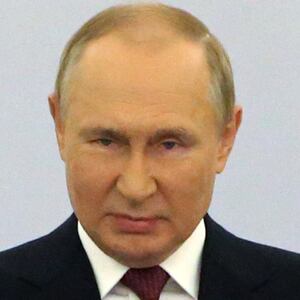Cracks are emerging among Vladimir Putin’s cronies over the Russian president’s military leadership and whether to use nuclear weapons in Ukraine.
As Ukrainian forces pummeled the city of Lyman over the weekend, Ramzan Kadyrov, a longtime Putin ally and leader of Chechnya, lashed out at Putin’s approach there, criticizing Russian troops’ withdrawal and the Russian commander of the Central Military District, Alexander Lapin.
“It’s not a shame that Lapin is mediocre, but the fact that he is covered at the top by the leaders in the General Staff,” he said on Saturday, taking a dig at the entire operation. “There is no place for nepotism in the army, especially in difficult times.”
Another key Putin ally, Evgeniy Prigozhin, Putin’s so-called “chef” who helped orchestrate Russian interference in the 2016 presidential elections in the United States and who heads up the mercenary group Wagner, seems to have also turned on Putin’s strategy in Ukraine.
“Send all these pieces of garbage barefoot with machine guns straight to the front,” Prigozhin said, referring to Putin’s army bosses.
The public criticism from key Putin supporters comes just as Russia is working to project unity and power on the world stage. After a series of defeats on the battlefield in Ukraine, Putin initiated a partial mobilization to bolster the war effort and held sham referenda in an attempt to illegally annex territories in Ukraine.
The internal divisions are mounting. Kadyrov also said that Russia should use a low-yield nuclear weapon in Ukraine. But the Kremlin is now jabbing back at him, suggesting that Kadyrov got too emotional and that cooler heads should prevail.
“The heads of Russia’s regions have the authority to express their point of view and to make assessments,” Kremlin spokesperson Dmitry Peskov said Monday. But “even in the most difficult moments emotions should probably be excluded from any comments.”
The Kremlin's effort to distance itself from Kadyrov’s hawkish stance comes just days after Russia’s efforts to illegally annex several regions in Ukraine. The move has set off alarm bells over whether the Kremlin will consider Ukrainian counter-offensives to take back the regions as attacks on Russian territory.
Russia’s nuclear doctrine lays out that Russia’s use of nuclear weapons should be used in self-defense. But Russian officials have reiterated in recent weeks that Russia reserves the right to use nuclear weapons if there is an existential threat to the country or if there is an attack against Russia, even if the attack uses conventional weapons alone.
And Russia has made it clear that it would defend the newly annexed regions in Ukraine—the Donetsk, Luhansk, Kherson, and Zaporizhzhia regions—with “all means at its disposal.”
Putin himself has hinted at Russia’s potential interest in using nuclear weapons in Ukraine.
The cleavage between Kadyrov, Prigozhin, and the Kremlin appears to be emblematic of larger problems in Moscow’s approach to Ukraine in the eighth month of the war. Although Russia hosted its sham referenda last week in Ukraine, the Kremlin acknowledged Monday that Russia is not necessarily confident in what territories it has specifically claimed as Russian, according to Peskov. Russia doesn’t control the territories it annexed, and Peskov suggested the Kremlin had to ask around about which borders it will claim as its own, an indication that the illegal annexation process may not be going as smoothly as Moscow expected.
“We are going to continue to consult the populations of these regions,” Peskov said.







